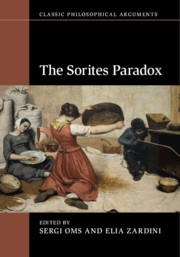Book contents
- Frontmatter
- Contents
- List of Contributors
- Acknowledgements
- Prelude
- Part I Solutions to the Sorites Paradox
- 1 Epistemicism and the Sorites Paradox
- 2 Supervaluationism, Subvaluationism and the Sorites Paradox
- 3 Contextualism and the Sorites Paradox
- 4 Incoherentism and the Sorites Paradox
- 5 Intuitionism and the Sorites Paradox
- 6 Rejection of Excluded Middle and the Sorites Paradox
- 7 Dialetheism and the Sorites Paradox
- 8 Degree Theory and the Sorites Paradox
- 9 Non-Transitivism and the Sorites Paradox
- Part II The Influence of the Sorites Paradox
- Coda
- References
- Index
6 - Rejection of Excluded Middle and the Sorites Paradox
from Part I - Solutions to the Sorites Paradox
Published online by Cambridge University Press: 20 September 2019
- Frontmatter
- Contents
- List of Contributors
- Acknowledgements
- Prelude
- Part I Solutions to the Sorites Paradox
- 1 Epistemicism and the Sorites Paradox
- 2 Supervaluationism, Subvaluationism and the Sorites Paradox
- 3 Contextualism and the Sorites Paradox
- 4 Incoherentism and the Sorites Paradox
- 5 Intuitionism and the Sorites Paradox
- 6 Rejection of Excluded Middle and the Sorites Paradox
- 7 Dialetheism and the Sorites Paradox
- 8 Degree Theory and the Sorites Paradox
- 9 Non-Transitivism and the Sorites Paradox
- Part II The Influence of the Sorites Paradox
- Coda
- References
- Index
Summary
The chapter presents a traditional model of partially defined predicates, its rejection of bivalence, and its responses to versions of the Sorites. An intractable problem with the model is then identified as arising from three assumptions: (i) the language containing the predicates is spoken by a vast but ill-defined community, (ii) the linguistic rules make fine-grained distinctions that go unnoticed by speakers, and (iii) the rules are abstracted from uses of the predicates. Progress, it is argued, requires dispensing with (i), embracing a plurality of micro-languages, and using them to construct perfected versions of (ii) and (iii). The resulting model defines the micro-language centered on an individual x at a time in terms of the dispositions of x to affirm or deny certain predicates of objects. Coordinated languages constructed from micro-languages centered on different individuals in a communicative situation allow one to assign assertive contents to uses of sentences. Given this, one can show how precise, knowable (though unknown) demarcations between items in the range of a vague predicate are determined. The technique, available to both defenders and opponents of excluded middle, can be used to reconstruct attractive responses to the Sorites, without some important defects.
Keywords
- Type
- Chapter
- Information
- The Sorites Paradox , pp. 118 - 134Publisher: Cambridge University PressPrint publication year: 2019



